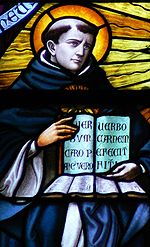- Disputationes
-
Disputationes (full title: Disputationes de Controversiis Christianae Fidei adversus hujus temporis Haereticos, also referred to as De Controversiis) is a work on dogmatics by Robert Bellarmine. It has been described as "the definitive defence of papal power".[1] After its publication, Bellarmine was regarded as Rome's foremost apologist on doctrine and papal power.[2]
It was written while Bellarmine was lecturing at the Roman College, and was first published at Ingolstadt in three volumes (1581, 1582, 1593)[1] or four.[3] This work was the earliest attempt to systematize the various controversies of the time, and made an immense impression throughout Europe, the strength of its arguments against Protestantism so acutely felt in Germany and England that special chairs were founded in order to provide replies to it.[4] Thomas Hobbes[1], Theodore Beza[5] and John Rainolds[5] were among those who wrote counter-arguments against the work.
The first volume treats of the Word of God, of Christ, and of the pope; the second of the authority of ecumenical councils, and of the Church, whether militant, suffering, or triumphant; the third of the sacraments; and the fourth of Divine grace, free will, justification, and good works.[3]
As much as Protestants disliked Bellarmine's theories, he was in fact moderate in his defence of papal power. In 1590, Pope Sixtus V had, or very nearly had,[4][6] the first volume placed on the Index Librorum Prohibitorum for denying temporal hegemony to the papacy. Bellarmine's reasoning was that though the pope is the vicar of Christ, since Christ did not exercise his temporal power, nor may the pope.[7]
The most important part of the work is contained in the five books regarding the pope. In these, after a speculative introduction on forms of government in general, holding monarchy to be relatively the best, Bellarmine says that a monarchical government and the related temporal power are necessary for the Church, to preserve unity and order in it.
Such power Bellarmine considers to have been established by the commission of Christ to St. Peter. He then proceeds to demonstrate that this power has been transmitted to the successors of Peter, admitting that a heretical pope may be freely judged and deposed by the Church since by the very fact of his heresy he would cease to be pope, or even a member of the Church.
The third section discusses the Antichrist. Bellarmine gives in full the theory set forth by the Church Fathers, of a personal Antichrist to come just before the end of the world and to be accepted by the Jews and enthroned in the Temple in Jerusalem—thus endeavoring to dispose of the Protestant exposition which saw in the pope the Antichrist.
The fourth section sets forth the pope as the supreme judge in matters of faith and morals, though making the concessions that the pope may err in questions of fact which may be known by ordinary human knowledge, and also when he speaks as a mere unofficial theologian. Bellarmine took in particular the example of Pope Honorius I, who had been anathemized by the Third Council of Constantinople as holding to monothelitism. He claimed that although monothelitism had been rightly condemned, Honorius was however orthodox as he had not really held these views, and that papal authority did not extend itself to the factual interpretation of what was to be found in Honorius or not.[8]
References
- ^ a b c Patricia Springborg. "Thomas Hobbes and Cardinal Bellarmine". History of Political Thought. XVI:4 (Winter 1995), pp. 503-531: 506.
- ^ Patricia Springborg. "Thomas Hobbes and Cardinal Bellarmine". History of Political Thought. XVI:4 (Winter 1995), pp. 503-531: 515-516.
- ^ a b http://www.masterliness.com/a/Robert.Bellarmine.htm
- ^ a b http://www.catholicity.com/encyclopedia/r/robert_francis_romulus_bellarmine,saint.html
- ^ a b Patricia Springborg. "Thomas Hobbes and Cardinal Bellarmine". History of Political Thought. XVI:4 (Winter 1995), pp. 503-531: 516.
- ^ http://dailycatholic.org/issue/2003Sep/sep14doc.htm
- ^ Patricia Springborg. "Thomas Hobbes and Cardinal Bellarmine". History of Political Thought. XVI:4 (Winter 1995), pp. 503-531: 516-517.
- ^ Pascal, 17th Letter of the Provincial Letters
 This article incorporates text from a publication now in the public domain: Jackson, Samuel Macauley, ed (1914). "article name needed". New Schaff-Herzog Encyclopedia of Religious Knowledge (third ed.). London and New York: Funk and Wagnalls.
This article incorporates text from a publication now in the public domain: Jackson, Samuel Macauley, ed (1914). "article name needed". New Schaff-Herzog Encyclopedia of Religious Knowledge (third ed.). London and New York: Funk and Wagnalls.History of Catholic theology Theologians · Teachings · Heresies General History History of the Catholic Church · Early Christianity · History of the Papacy · Ecumenical Councils · Timeline of the Catholic Church · History of Christianity · History of Christian theology
Church beginnings First Epistle of Clement · Didache · Ignatius of Antioch · Epistle of Barnabas · Justin Martyr · Irenaeus · Tertullian · Origen · Antipope Novatian · CyprianConstantine to
Pope Gregory IEarly Middle Ages Monothelitism · Ecthesis · Iconoclasm · Transubstantiation dispute · Predestination disputes · John Scotus EriugenaHigh Middle Ages Mysticism & Reforms Protestant Reformation and
Counter-ReformationBaroque Period to
French RevolutionJacques-Bénigne Bossuet · Francisco Suárez · François Fénelon · Jansenism · Blaise Pascal · Alphonsus Maria de Liguori · Louis de Montfort · Alfonso Muzzarelli · Louis Thomassin · Jean de La Fontaine19th century 20th-21st century  Pope Portal
Pope Portal  Catholicism PortalCategories:
Catholicism PortalCategories:- History of Roman Catholicism
- 16th-century works
- Religious belief and doctrine
- 1581 books
- 1582 books
- 1593 books
Wikimedia Foundation. 2010.
